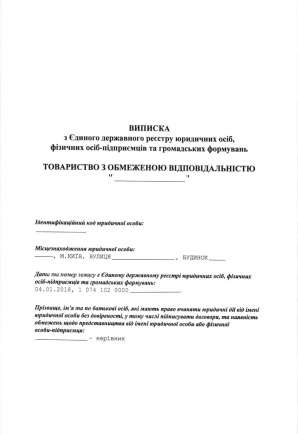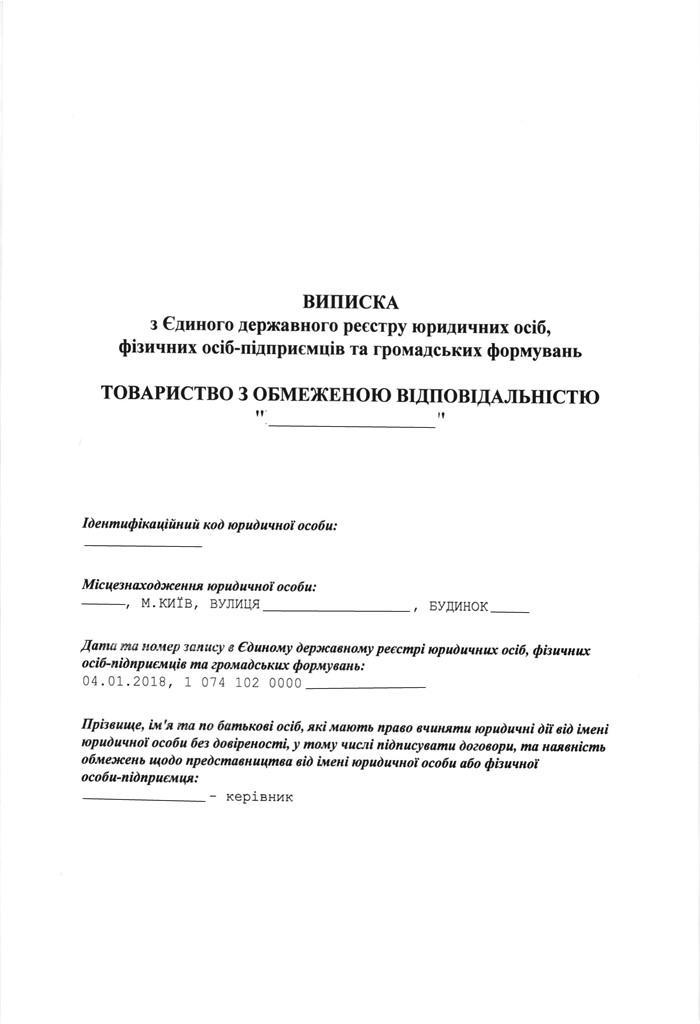What to do if you did not manage to submit a report on the ultimate beneficiaries and the structure of the company's ownership?
Cost of services:
Reviews of our Clients
... our work on joint projects assured us of your high level of professionalism
Today, one of the most urgent and painful issues for most owners and managers of companies registered in Ukraine is missing the deadline for providing information about the ultimate beneficial owners and the ownership structure of the company.
Now we are faced with a situation where the deadline expires and there are a significant number of companies that failed to submit reports to the registrars. Or they have submitted documents on time, but the registrars have stopped their consideration or denied them due to mistakes in the documents.
What are the possible consequences and what to do next?
In this article we will elaborate on the following:
- liability for missing the deadline for submitting information to the registrar;
- the procedure of imposing a fine and its stages;
- the way to protect your rights at each of these stages.
If you are interested in protection not in theory, but in practice - please contact our experts for personal advice and protection of your interests.
You may also like: Everything About Beneficiary Reporting
Who can be held liable for failure to provide information on beneficiaries?
Legislation of Ukraine provides for liability of managers and those who are authorized to act on behalf of a legal entity for failure to submit or untimely submission of information to the state registrar about the ultimate beneficial owner of the company, or the lack of it until 11 July 2022.
The fine ranges from UAH 17,000 to UAH 51,000.
Attention! The liability may fall on the shoulders of the head of the company or a person authorized to act on behalf of the company, rather than on the company.
When and how is a penalty charged for missing the deadline for providing information about beneficiaries?
The liability won’t be imposed immediately, but after a certain period of time, and it is up to you to react in time to the procedure.
Please note! Even before the imposition of penalties, you can take a number of proper actions that will help reduce them or avoid them altogether on legal grounds. Let's talk about this in detail.
Stage 1: If the state registrar discovers a fact of failure to submit the information, it must inform the territorial office of the Ministry of Justice of Ukraine at the location of the legal entity within twenty-four hours by a registered letter.
Stage 2: Then the Ministry of Justice or its territorial body sends a registered letter informing the manager of the respective company or a person authorized to act on behalf of the company, including the requirement to address them within one month for drawing up a protocol on an administrative offence.
That is, the head or an authorized person must personally visit the state authority for drawing up a protocol.
At this stage, the important fact will be the availability of evidence of receipt of such notification by the head or the authorized person and compliance of this letter in the form established by law.
Stage 3: The Ministry of Justice or its relevant territorial body draws up a protocol on an administrative offence. The protocol of an administrative offence must be drawn up no later than twenty-four hours from the date of revealing the offence.
At this stage you must pay attention to the fact that the protocol must be properly drawn up and executed, and must comply with the requirements of the law.
The person in respect of whom the protocol is drawn up, must be acquainted with his/her rights and obligations, in addition, the person has the right to refuse to sign the protocol and provide his explanations.
Please note! Protocol on an administrative offence cannot be appealed, since it is not a decision of the authority, agency or public officer (in our case the Ministry of Justice or its relevant territorial body) by its legal nature and content, but it is only evidence in a case of an administrative offence.
The basis for bringing a person to administrative liability is a court decision, namely a decision on the imposition of administrative penalties.
Stage 4: The protocol drawn up by an official of the Ministry of Justice must be sent to the district court at the registered place of residence or stay of the person in respect of whom the protocol is drawn up for consideration of the administrative offence case.
The territorial jurisdiction of the court is important, because the protocol must be sent exactly to the court at the registered place of residence or stay of the person.
Stage 5: The court, having considered the case of an administrative offense, issues a decision on the case.
Please note! An administrative penalty (fine) may be imposed by the court not later than three months from the date of the offence.
An administrative offence is an unlawful, culpable (intentional or negligent) act or omission of a person. That is, the guilt of the person in respect of whom the Protocol was drawn up must be proved.
The key aspects of this procedure!
If you received information at the second stage about the intention to draw up a Protocol on an administrative offence, or you understand that the deadline has passed, so the Protocol may soon be drawn up, you have only a few options:
- Register information about the beneficiaries;
- Wait for Stage 4 - submission of a matter to court, and assert your rights in court or appeal the court's decision.
Please note! At each step, we emphasized the rules of their implementation – if you realize that your rights or the procedure have been violated at any of the stages – this may be your chance to appeal.
Contact the lawyers if you realize that the time for filing information has passed - we will closely monitor each stage of the procedure and report about any inconsistencies with the established procedure.
The legislation expressly establishes the obligation of managers or persons authorized by them to inform the state registrar of any changes in the structure of the company, and at the same time, during the state registration of any other changes in the information contained in the Unified State Register, to provide information about the beneficiaries.
That is, you can provide information about beneficiaries along with any other changes. However, we recommend doing it only under the supervision of a lawyer, because apart from the fine for non-submission of the documents the legislation stipulates a fine for late submission of the documents.
What if you are already fined for failing to report beneficiary information?
Even if the relevant documents are submitted to the state registrar in a timely manner, there is a great risk of a refusal to accept the documents or a suspension of the consideration of the documents.
The main difficulty is that there are clear requirements for drawing up and executing documents for the registrar, but not all registrars' requirements are covered by legislation, and in practice managers face refusals to accept documents by registrars on formal grounds.
Please note! If the director has already been issued a protocol or he has already been prosecuted, he/she is still obliged to provide the registrar with information about the ultimate beneficial owners and the ownership structure of the company.
In case a fine has already been imposed and it is impossible to appeal against the Decision on the administrative liability, we advise you to pay the fine and contact our experts for legal advice in order to avoid further penalties from the state enforcement officers.
Please note! You will need to submit information about the beneficiaries in any case. And you need to do this under the close supervision of a lawyer to avoid further problems.
Do not waste your time! If you realize you have missed the deadline for filing beneficiary information, don’t hesitate to contact our experts for protection and assistance. We offer you the following services:
- Preparing a package of documents to be submitted to the state registrar for providing information on the ultimate beneficial owners and the ownership structure of the legal entity.
- Analysis of your situation and search for the optimal algorithm of actions to minimize time and expenses.
- Protection of your interests at the state control authorities.
- Appealing court decisions.
Didn’t find an answer to your question?
Our clients





